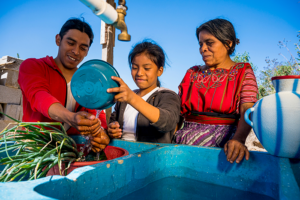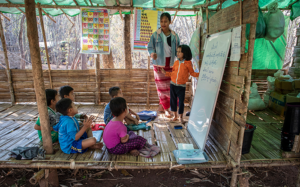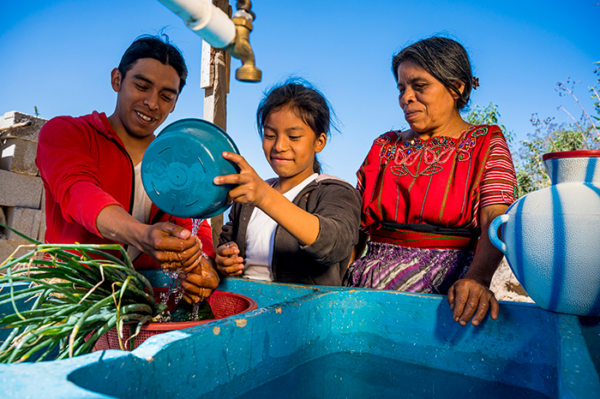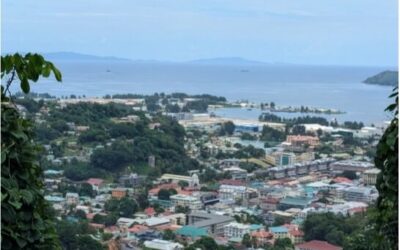In today’s world, access to clean water and quality education are fundamental humanitarian challenges. These challenges disproportionately affect rural populations. More than half of the United Nations’ 17 Sustainable Development Goals (SDGs)cannot be realized without eliminating water insecurity and enhancing education, especially in the sciences. Humanitarian organizations like Chemists Without Borders play a vital role in addressing these interconnected issues. We do so through leveraging science and community engagement. By focusing on access to clean water and enhancing rural education, we can create sustainable, equitable solutions that empower communities and improve overall well-being.
Statistics highlight the urgency of these issues. About 59 million children of primary school age are out of school globally, with a considerable number residing in rural areas. It is projected that by 2025, 1.8 billion people will face absolute water scarcity. Addressing these challenges requires a concerted effort and commitment to innovative, science-based strategies.
The Importance of Access to Clean Water and Sanitation
 It is estimated that by 2030, 2 billion people globally will live without safely managed drinking water, 3 billion without safely managed sanitation, and 1.4 billion without basic hygiene services. In 2022, nearly half the world’s population experienced severe water scarcity for at least part of the year. Climate change will undoubtedly worsen these issues. Contaminated water is a leading cause of health issues. Every year, 3.6 million people die from water-related diseases, and 2.2 million are children under five. That is equivalent to a jumbo jet crashing every hour.
It is estimated that by 2030, 2 billion people globally will live without safely managed drinking water, 3 billion without safely managed sanitation, and 1.4 billion without basic hygiene services. In 2022, nearly half the world’s population experienced severe water scarcity for at least part of the year. Climate change will undoubtedly worsen these issues. Contaminated water is a leading cause of health issues. Every year, 3.6 million people die from water-related diseases, and 2.2 million are children under five. That is equivalent to a jumbo jet crashing every hour.
Rural populations are particularly vulnerable to these challenges. More than 80% of individuals with safely managed drinking water reside in urban areas. This disparity leaves rural communities disproportionately affected by access issues, often relying on unsafe water sources for their daily needs. In many developing regions, the lack of infrastructure, financial resources, and technical expertise hinders efforts to improve water quality and availability. Addressing these challenges requires targeted initiatives prioritizing sustainable water management and investment in rural education. These solutions, in turn, empower communities to develop effective solutions tailored to their specific needs.
Chemists Without Borders has implemented water management technologies to address this challenge. We do this by developing innovative approaches to safely removing contaminants and building sustainable solutions to improve access to clean water. Most recently, we completed a full-scale solution to remove arsenic from drinking water and significantly improved the sanitation and hygiene to benefit over 1500 students in a village in Bangladesh. Our work is scalable and replicable in myriad locations suffering from arsenic contamination and other contaminants.
Along with our on-the-ground initiatives, we work with universities and institutes dedicated to addressing access to clean water. Innovative approaches such as well-sharing programs can lead to greater access and, through proper economic models, ensure long-term sustainability. Our multifaceted approach enhances community knowledge and promotes collective ownership of local water resources. Engaging local stakeholders ensures the initiatives are culturally appropriate and grounded in community needs. These efforts lead to greater adoption and success of the programs.
Empowering Rural Communities through Science Education
 In tandem with improving water access, enhancing rural education is critical for sustainability and community resilience. Educational disparities remain prevalent. UNESCO notes that rural children are nearly three times less likely to complete secondary school compared to their urban peers. Today, 251 million children remain out of school worldwide, while 650 million leave without a secondary school certificate. Moreover, many children in rural areas face significant educational barriers. Their challenges include in adequate school facilities, poorly trained teachers, and economic pressures leading to higher dropout rates.
In tandem with improving water access, enhancing rural education is critical for sustainability and community resilience. Educational disparities remain prevalent. UNESCO notes that rural children are nearly three times less likely to complete secondary school compared to their urban peers. Today, 251 million children remain out of school worldwide, while 650 million leave without a secondary school certificate. Moreover, many children in rural areas face significant educational barriers. Their challenges include in adequate school facilities, poorly trained teachers, and economic pressures leading to higher dropout rates.
Science education in rural settings is vital for empowering individuals and communities. A robust science curriculum fosters critical thinking and problem-solving skills essential for addressing issues like agriculture, water management, and health. Teaching the scientific method and hands-on scientific learning through experiments and real-world problems nurtures curiosity and knowledge acquisition.
At Chemists Without Borders, we address these educational challenges by partnering with local schools to develop appropriate science curricula and providing essential resources for studying the sciences. Through our student chapters at regional and national universities, we aim to establish a sustainable path for continuous learning. Science is, at its heart, a team activity. Our goal is to help promote collaboration and communication among students, reinforcing teamwork and social skills essential in community building.
By advancing science education in these areas, we can help foster a generation capable of creating meaningful change and building a more equitable future.
Bridging the Gap for Populations Most in Need
As humanitarian challenges continue to evolve globally, the collaboration between science and humanitarian efforts is crucial. The growing impact of climate change, the lack of serious progress in water management and access, and limited success in improving educational attainment globally, continue to stress developing countries. Additionally, UNHCR reports 117 million people worldwide, 40% of them children, are forcibly displace. 75% of the world’s displaced population are hosted by low-and middle-income countries, further exacerbating the already fragile infrastructure and lack of resources within the host countries.
By leveraging the scientific method, drawing on evidence-based practices, implementing effective water management techniques, and enhancing educational opportunities, we can help rural communities create sustainable solutions that empower their development.
In summary, by focusing on access to clean water and rural education, Chemists Without Borders improves the quality of life for vulnerable communities. Integrating education, service, innovation, and community engagement is vital to building a more equitable, sustainable future for all.
Ramin Sedehi
CEO& President – Chemists Without Borders
November 2024
Sources
Water Scarcity
- World Health Organization (WHO) and UNICEF, “Progress on drinking water, sanitation and hygiene: 2000-2020,” 2021. Link
- WHO/UNICEF Joint Monitoring Programme for Water Supply, Sanitation, and Hygiene (JMP) report, “Progress on drinking water, sanitation and hygiene: 2000-2020,” 2021.
- United Nations Water, “The United Nations World Water Development Report 2020: Water and Climate Change,” 2020. Link
- WHO, “Diarrheal disease,” 2021. Link
- WHO/UNICEF Joint Monitoring Programme, “Progress on drinking water, sanitation and hygiene: 2000-2020,” 2021.
Rural Education
- UNESCO (United Nations Educational, Scientific and Cultural Organization), “Global Education Monitoring Report 2020: Inclusion and education: All means all,” 2020. Link
- UNESCO Institute for Statistics, “Out-of-school children and youth,” 2020. Link
- UNESCO, “Global Education Monitoring Report 2019: Migration, displacement and education: Building bridges, not walls,” 2019. Link




